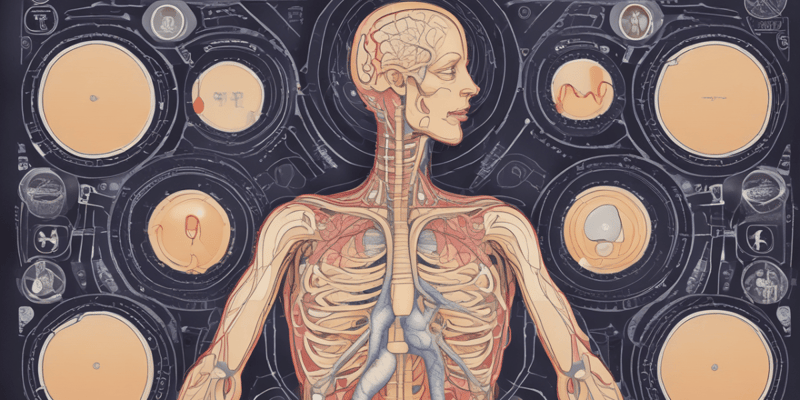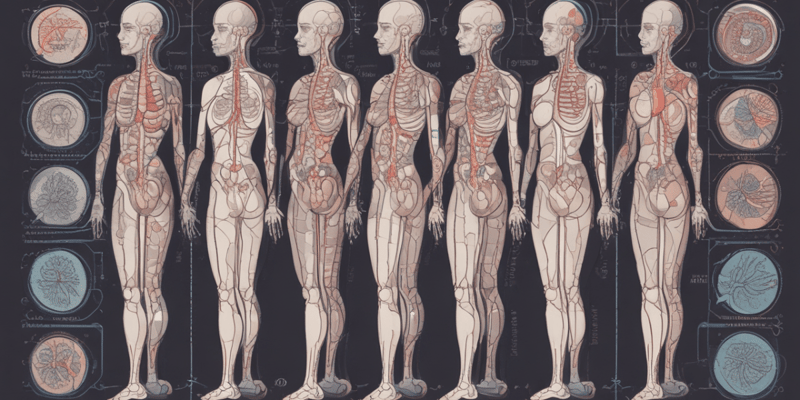Podcast Beta
Questions and Answers
What is the primary function of the adrenal cortex?
Which of the following hormones is produced by the beta cells of the pancreatic islets?
What role does negative feedback play in hormone regulation?
What is the primary mineralocorticoid secreted by the adrenal cortex?
Signup and view all the answers
Which gland is responsible for producing melatonin?
Signup and view all the answers
What disease is associated with hypersecretion of thyroid hormones?
Signup and view all the answers
What type of cells in the pancreas secrete somatostatin?
Signup and view all the answers
Which part of the pituitary gland secretes hormones like oxytocin and antidiuretic hormone?
Signup and view all the answers
What glands secrete a hormone that regulates blood calcium levels?
Signup and view all the answers
What type of hormone is primarily secreted by the adrenal medulla?
Signup and view all the answers
Study Notes
Endocrine System Glands
- Adenohypophysis refers to the anterior pituitary gland, crucial for hormone production.
- Adrenal Cortex is the outer layer of the adrenal gland, responsible for secreting corticosteroids involved in metabolism and immune response.
- Adrenal Medulla, the inner part of the adrenal gland, releases catecholamines like epinephrine and norepinephrine, which prepare the body for fight-or-flight responses.
- Alpha Cells in the pancreas produce glucagon, a hormone that raises blood glucose levels.
- Beta Cells in the pancreas secrete insulin, which lowers blood glucose levels.
- Catecholamines are hormones released by the adrenal medulla during stress, impacting cardiovascular and metabolic functions.
- Corticosteroids encompass a range of steroid hormones released by the adrenal cortex that regulate various physiological processes.
- Delta Cells produce somatostatin, which inhibits the release of other hormones, including insulin.
- Endocrine Glands are ductless structures that secrete hormones directly into systemic circulation.
- Glucocorticoids like cortisol are key hormones produced by the adrenal cortex, impacting glucose metabolism and immune function.
- Gonads are the primary reproductive organs, with testes in males producing sperm and ovaries in females producing eggs and sex hormones.
- Graves' disease is an autoimmune disorder that leads to excessive thyroid hormone secretion, causing symptoms like weight loss and hyperactivity.
- Hormones are biochemical messengers secreted by glands, regulating various bodily functions.
- Hypophyseal Portal System connects the hypothalamus to the anterior pituitary, facilitating direct hormone communication.
- Inhibiting Hormones from the hypothalamus decrease secretion of hormones from the anterior pituitary, maintaining hormonal balance.
- Islets of Langerhans are specialized regions in the pancreas that contain endocrine cells, regulating blood sugar levels.
- Mineralocorticoids, such as aldosterone, regulate sodium and potassium balance and influence blood pressure.
- Negative Feedback is a regulatory mechanism that decreases hormone production when the desired effect is achieved, promoting homeostasis.
- Neurohypophysis is another name for the posterior pituitary gland, which releases hormones like oxytocin and vasopressin.
- Pancreas has dual functions, serving both as an endocrine organ that regulates blood glucose and as an exocrine organ that secretes digestive enzymes.
- Parathyroid Glands help maintain calcium homeostasis by secreting parathyroid hormone (PTH), which raises blood calcium levels.
- Pineal Gland synthesizes melatonin, a hormone that regulates sleep-wake cycles, with levels fluctuating based on light exposure.
- Pituitary Gland controls numerous hormonal activities and is divided into anterior and posterior lobes, each with distinct functions.
- Releasing Hormones stimulate the anterior pituitary to release specific hormones, prompting various biological activities.
- Sex Steroids include hormones such as testosterone and estrogen, which influence reproductive functions and sexual characteristics.
- Target Cells are equipped with specific receptors to respond to particular hormones, ensuring precise physiological responses.
- Tetany is a condition of prolonged muscle contraction caused by insufficient calcium levels (hypocalcemia).
- Thymus plays a significant role in the immune system by producing hormones that facilitate the development of T-cells.
- Thyroid Gland regulates metabolic rate and energy expenditure by releasing hormones such as thyroxine (T4) and triiodothyronine (T3).
Key Topics for Chapter 13
- Explore the function of the endocrine system and its role in regulating bodily functions.
- Compare the endocrine system with the nervous system regarding response time and mechanisms of action.
- Understand the classification and actions of different hormones in regulating physiological processes.
- Examine the relationship between the pituitary gland and the hypothalamus in hormone regulation.
- Review the hormones produced by the hypothalamus and pituitary gland and their respective functions.
- Analyze how central nervous system controls the secretions of the pituitary gland through feedback mechanisms.
- Identify the location, structure, and function of the adrenal glands and their role in stress response.
- Discuss the significance of the hypothalamic-pituitary-adrenal axis in managing stress.
- Study the various endocrine organs, including the pineal gland, thymus, thyroid gland, parathyroid glands, pancreas, and gonads.
- Investigate the regulation of blood glucose levels and related disorders such as diabetes mellitus.
- Explore other endocrine tissues and chemicals involved in hormonal balance.
- Recognize the microbiome as an emerging concept in endocrine function, potentially influencing health and disease.
Studying That Suits You
Use AI to generate personalized quizzes and flashcards to suit your learning preferences.
Related Documents
Description
Test your knowledge on the key terms related to the endocrine system, focusing specifically on various glands such as the adrenal and pituitary glands. This quiz will help you understand their functions and significance in the human body.




